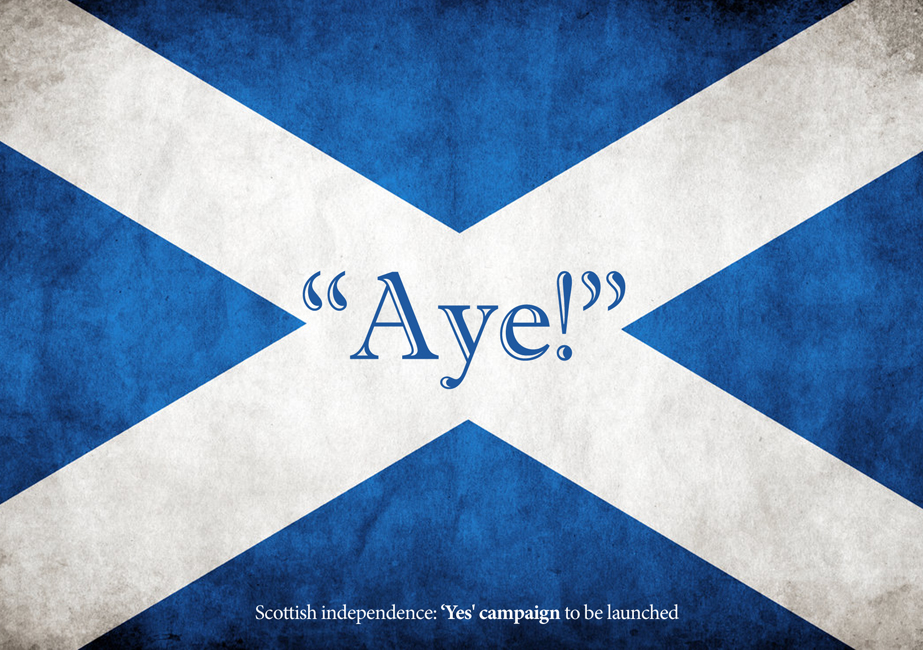Do not wait to strike till the iron is hot; but make it hot by striking. -William Butler Yeats #quote
— Tim Fargo (@alphabetsuccess) September 13, 2014
 For Scots (or those of us of Scottish heritage), this week’s independence plebiscite is the turning point of a lifetime. For anyone who understands the history of Scotland- which is largely a story of subjugation to the will of England- independence should hold significant appeal. For the first time in the more than three centuries, Scots are presented with an opportunity to chart their own course. I believe they should grasp it- eagerly and without hesitation.
For Scots (or those of us of Scottish heritage), this week’s independence plebiscite is the turning point of a lifetime. For anyone who understands the history of Scotland- which is largely a story of subjugation to the will of England- independence should hold significant appeal. For the first time in the more than three centuries, Scots are presented with an opportunity to chart their own course. I believe they should grasp it- eagerly and without hesitation.
Proponents of the United Kingdom will make an argument that Scotland and England are better together. That argument is certainly worthy of consideration, because there are significant elements of truth in it. Both sides can put forth their case with some authority and validity. Perhaps Scotland and England really are better off together than separately…but there’s more to it than mere economics. Factor in history and emotion, and the opportunity facings Scots is undeniable. After more than three centuries, Scots have the opportunity to free themselves from London’s rule. They can chart their own path, make their own history, take their own risks. England may no longer be the malevolent, repressive ruler of Scots it once was, but history is difficult to overlook.
There are no guarantees about what the future would hold for an independent Scotland, but Scots deserve to determine what that future looks like. Scotland’s future should be determined in Edinburgh, not in London, and this plebiscite offers the opportunity to make that happen. England should look past self-interest and recognize that Scotland deserves to make its own choices. Then again, England didn’t get to be where it is today by discounting self-interest.
Of course, there are those with a vested interest in maintaining the status quo…and the threats and fear-mongering are being ratcheted up as Thursday’s vote draws nigh. With the polls being too close for predictions to be made, there are those on both sides making dire predictions. Some of that conjecture may well turn out to be accurate, but less than a week before the vote, it’s difficult to sort emotion and fear-mongering from fact and reality.
Next week, Scottish voters will decide whether to declare independence from the United Kingdom. Scottish secession once seemed like a bizarre lost cause, but polls have tightened, setting off alarms in England and throughout the world. Critics outside Scotland think that Scottish independence is a crazy idea for the Scots and a bad example for the world, encouraging other separatist movements in less peaceful regions, with turmoil and financial ruin the sure result. But the commentators are wrong. Scotland should go free if that’s what the Scots want.
Scotland will win whether Scots chose independence or to maintain the status quo. The fact that they’re holding a vote free of violence and bloodshed is a reflection of maturity as much as readiness for self-determination. Croatia, Bosnia-Herzegovina, Kosovo, Macedonia, and Slovenia are free of the heavy hand of Serb-dominated Yugoslavia, but it took significant bloodshed and strife to achieve that independence. Scotland can achieve its freedom without a shot being fire. Independence is a legitimate, realistic, and achievable dream. Those who’ve pushed for Scotland to declare independence have done so for very strong and defendable reasons.
This isn’t to say that divorce will be easy, clean, and seamless. Far from it; no divorce ever is. The United Kingdom is nothing if not entangled; undoing the knots will be a lengthy, messy, expensive, and exceedingly difficult and trying process.
The Scots already enjoy a great deal of autonomy within the United Kingdom. Although the U.K. parliament is the supreme source of law throughout Great Britain, the Scottish legislature makes many of the laws that govern Scotland, and Scottish courts enforce them. Unlike many secessionists, Scottish nationalists can’t complain that they’re being forced to learn someone else’s language or that they have no control over how their children are educated. Scotland receives more money from the U.K. than its citizens pay out in taxes. And a Scottish divorce would be a messy, lengthy process that would distract political leaders for years.
More than anything, the independence plebiscite is a test of Scotland’s confidence in itself. Independence comes with risks, and there’s no way to fully and accurately assess those risks. History will be the ultimate judge of whether Scots make the right decision…whatever the result of Thursday’s vote.
For my part, my heritage is Scottish, not English, and I’ve always very cognizant of England’s historical oppression of Scotland. While I’m not a proponent of maintaining lengthy historical grudges, neither should history be ignored. Scots deserve to chart their own course as an independent nation…and I hope the “YES” votes will carry the day on Thursday. That said, even if the “NO” votes prevail, England needs to ensure that Scotland’s remaining in the UK will be advantageous to Scots. There’s been more than enough contentious history and bloodshed between England and Scotland.
Scotland deserves to be an independent nation, the captain of its own ship and in charge of its own destiny. A “YES” vote seems the perfect way to honor those who died in pursuit of freedom from English oppression…and it would allows Scots to finally be free to make decisions for Scots. Isn’t that what freedom’s all about?
